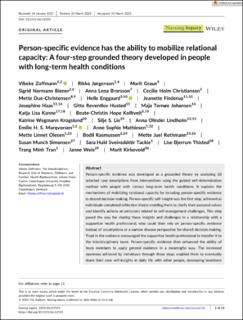| dc.contributor.author | Zoffmann, Vibeke | |
| dc.contributor.author | Jørgensen, Rikke | |
| dc.contributor.author | Graue, Marit | |
| dc.contributor.author | Biener, Sigrid Normann | |
| dc.contributor.author | Brorsson, Anna Lena | |
| dc.contributor.author | Christiansen, Cecilie Holm | |
| dc.contributor.author | Due-Christensen, Mette | |
| dc.contributor.author | Enggaard, Helle | |
| dc.contributor.author | Finderup, Jeanette | |
| dc.contributor.author | Haas, Josephine | |
| dc.contributor.author | Husted, Gitte Reventlov | |
| dc.contributor.author | Johansen, Maja Tornøe | |
| dc.contributor.author | Kanne, Katja Lisa | |
| dc.contributor.author | Kolltveit, Beate-Christin Hope | |
| dc.contributor.author | Krogslund, Katrine Wegmann | |
| dc.contributor.author | Lie, Silje Stangeland | |
| dc.contributor.author | Lindholm, Anna Olinder | |
| dc.contributor.author | Marqvorsen, Emilie H. S. | |
| dc.contributor.author | Mathiesen, Anne Sophie | |
| dc.contributor.author | Olesen, Mette Linnet | |
| dc.contributor.author | Rasmussen, Bodil | |
| dc.contributor.author | Rothmann, Mette Juel | |
| dc.contributor.author | Simonsen, Susan Munch | |
| dc.contributor.author | Tackie, Sara Huld Sveinsdóttir | |
| dc.contributor.author | Thisted, Lise Bjerrum | |
| dc.contributor.author | Tran, Trang Minh | |
| dc.contributor.author | Weis, Janne | |
| dc.contributor.author | Kirkevold, Marit | |
| dc.date.accessioned | 2023-09-28T06:03:44Z | |
| dc.date.available | 2023-09-28T06:03:44Z | |
| dc.date.created | 2023-05-11T09:35:13Z | |
| dc.date.issued | 2023 | |
| dc.identifier.citation | Nursing Inquiry. 2023, . | en_US |
| dc.identifier.issn | 1320-7881 | |
| dc.identifier.uri | https://hdl.handle.net/11250/3092557 | |
| dc.description.abstract | Person-specific evidence was developed as a grounded theory by analyzing 20 selected case descriptions from interventions using the guided self-determination method with people with various long-term health conditions. It explains the mechanisms of mobilizing relational capacity by including person-specific evidence in shared decision-making. Person-specific self-insight was the first step, achieved as individuals completed reflection sheets enabling them to clarify their personal values and identify actions or omissions related to self-management challenges. This step paved the way for sharing these insights and challenges in a relationship with a supportive health professional, who could then rely on person-specific evidence instead of assumptions or a narrow disease perspective for shared decision-making. Trust in the evidence encouraged the supportive health professional to transfer it to the interdisciplinary team. Person-specific evidence then enhanced the ability of team members to apply general evidence in a meaningful way. The increased openness achieved by individuals through these steps enabled them to eventually share their new self-insights in daily life with other people, decreasing loneliness they experienced in self-management. Relational capacity, the core of the theory, is mobilized in both people with long-term health conditions and healthcare professionals. Further research on person-specific evidence and relational capacity in healthcare is recommended. | en_US |
| dc.language.iso | eng | en_US |
| dc.rights | Navngivelse 4.0 Internasjonal | * |
| dc.rights.uri | http://creativecommons.org/licenses/by/4.0/deed.no | * |
| dc.title | Person-specific evidence has the ability to mobilize relational capacity: A four-step grounded theory developed in people with long-term health conditions | en_US |
| dc.type | Peer reviewed | en_US |
| dc.type | Journal article | en_US |
| dc.description.version | publishedVersion | en_US |
| cristin.ispublished | true | |
| cristin.fulltext | original | |
| cristin.qualitycode | 1 | |
| dc.identifier.doi | 10.1111/nin.12555 | |
| dc.identifier.cristin | 2146861 | |
| dc.source.journal | Nursing Inquiry | en_US |
| dc.source.pagenumber | 14 | en_US |

